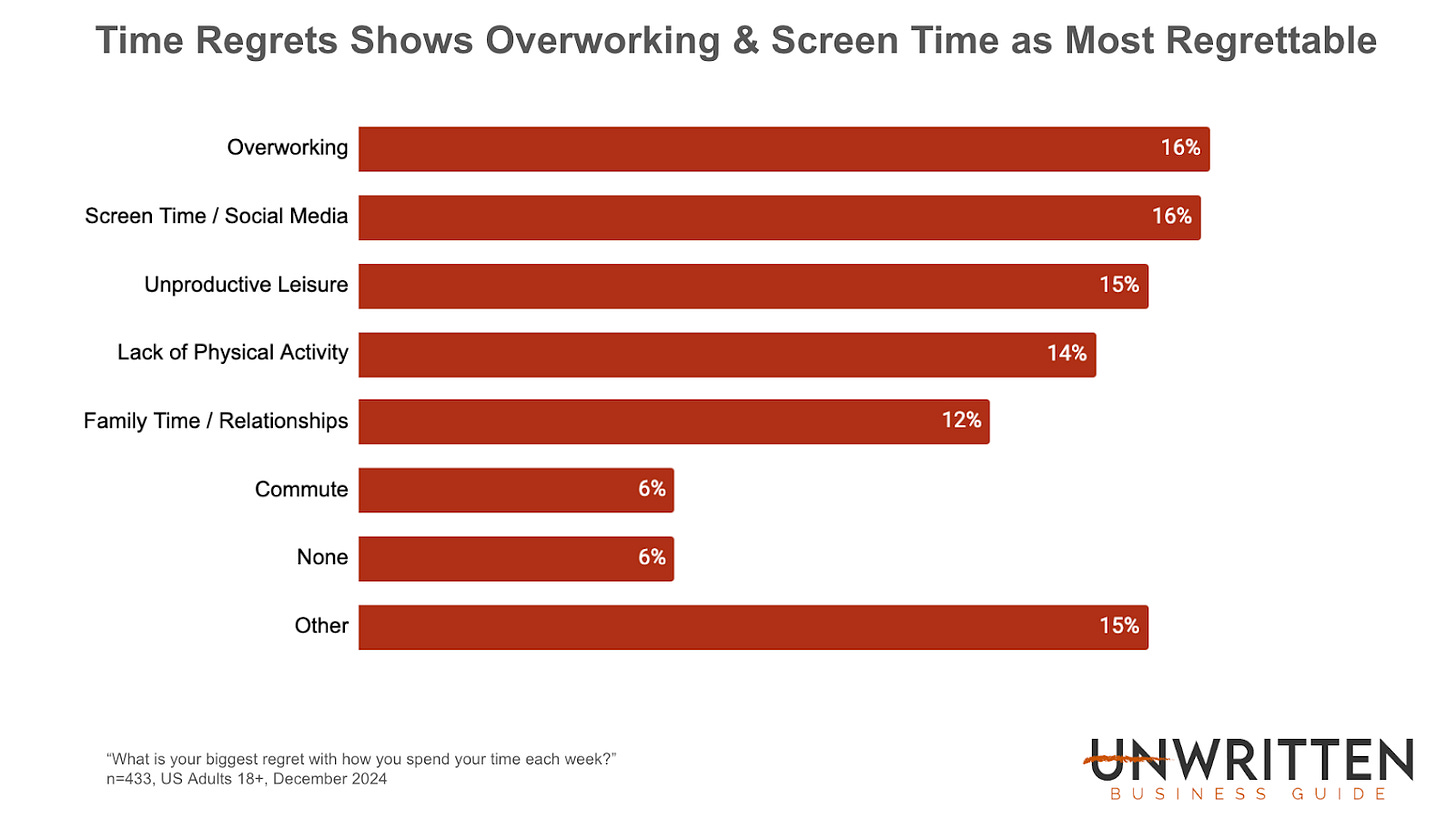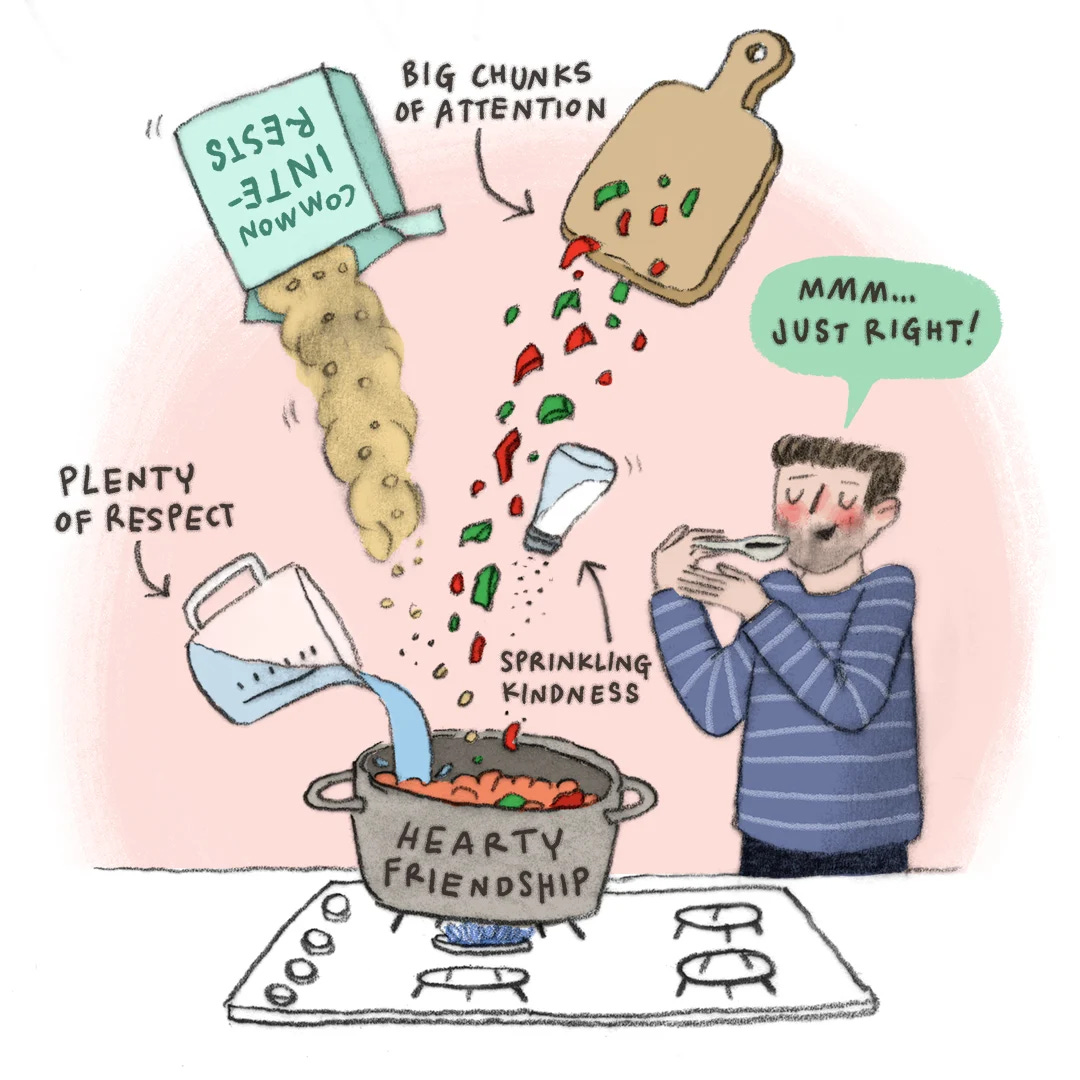If you’re feeling overworked, like you’re spending too much time on your phone, or that you’re not exercising enough, we’ve got stories for you!
In the early 2000’s, Bronnie Ware, an Australian nurse who specialized in palliative care (providing comfort and support to patients with terminal illnesses) began an internet blog detailing her observations of the most common regrets expressed to her by people during the last months of their lives. The blog gained so much traction that she eventually published a book in 2012 titled “The Top 5 Regrets of the Dying”.
The 5 most common regrets of people who were dying included:
- I wish I’d had the courage to live a life true to myself, not the life others expected of me
- I wish I hadn’t worked so hard
- I wish I’d had the courage to express my feelings
- I wish I had stayed in touch with my friends
- I wish that I had let myself be happier
These regrets are both deeply sad, but also unsurprising. Many of us likely fear expressing such remorse about the way we spent our lives when we reach our elderly years. However, these are what we would call “20/20 hindsight” regrets: things which are obvious only in retrospect.
What is less obvious, is how the smaller things we regret in the present/today can ultimately lead to these deeper and more tragic regrets at the end of our mortality. We recently conducted a large study with a 99% confidence interval and wanted to share one of the most interesting takeaways, which is asking people “What is your biggest regret with how you spend your time each week?”
Study Results
This comprehensive study was done to determine how people use their time, and included a question on people’s biggest regret with how they use their time. The results here were both fascinating and yet unsurprising.
We’ve included below the results of the study + some direct quotes and observations that have caused us to start thinking about changes we need to make in our lives so that we don’t end up expressing similar regrets to the patients Bronnie Ware worked with.
These ideas aren’t fully fleshed out yet, but we wanted to provide some starting points for people to start thinking about changes they need to make to the way they balance their lives.

Overworking
“I’m so burned out from work that I struggle to want to plan or attend fun or pleasurable activities. I work, and then need recovery downtime. I’m too exhausted to do things in the evening. I want to sit and do nothing (no schedule, no appointments, no decisions to be made, etc).” – Anonymous respondent
I have felt a lot like this person quoted, where I have worked lots of hours and wanted nothing more than to do nothing. When I was taking Traeger public I had to pull some long hours and definitely felt overworked:
It was lonely. I couldn’t tell anyone what I was working on.
It was stressful. My work was worth hundreds of millions of dollars to be won or lost.
It was incredible. There’s nothing like ringing the bell in the New York Stock Exchange.
Sometimes overworking is necessary, but it’s definitely not sustainable.
Read more here: The Unwritten Guide to Taking a Company Public: Behind the Scenes of Traeger’s IPO
Screen Time / Social Media
“My biggest regret is the amount of time I spend idly on social media. I can’t seem to pull myself away.” – Anonymous Respondent
Early in my career there was a time when social media platforms were taking off and I prided myself on having over 100 different accounts. I remember having a Klout score that ranked my online influence and it was in the top 1% of people online. What I would do to go back in time and delete all of those silly accounts! It made me marginally better at my job and vacuumed up precious hours out of each day.
Have you ever wondered why your dreams never have phones in them? There’s tons of interesting research around this, and the short answer is it never is a replacement for real interactions.
Unproductive Leisure
“My biggest regret is not spending my free time being more productive. Normally, this is due to my energy levels once I’ve finished work for the day.” – Anonymous Respondent
I have been taking ice baths for the last two years (I know you just rolled your eyes – stick with me). Ice baths have been transformative for my energy levels. I’ll hop in an ice bath after a morning workout and it’s the equivalent of drinking two cups of coffee – every hour throughout your whole day. I start the day strong and finish in the evening strong. If you don’t believe me, read the research around ice baths.
The best way to make unproductive time more productive is to change your energy level.

Lack of Physical Activity
“I regret that I do not have more time (or ability) to exercise. Overall, I’d like to be more active.” – Anonymous Respondent
David Goggins is a popular Navy Seal, having broken the world record for most pullups in 24 hours (4,030 if you’re curious), competed and won in many ultra marathons, and is a best-selling author.
In David Goggins’ book, Never Finished, he says “Live with a Day One, Week One mentality. This mentality is rooted in self-discipline, personal accountability, and humility. While most people stop when they’re tired, I stop when I am done. In a world where mediocrity is often the standard, my life’s mission is to become uncommon amongst the uncommon.”
You can become uncommon by just doing something today.
Family Time / Relationships
“I don’t spend enough time with family and friends.” – Anonymous Respondent
During covid I spent A LOT of time with my family. It was incredible. My wife and I also needed time with friends, so we instituted a personal night. It was a night each week where we could make plans with friends guilt-free. She would go to book club, out for dinner, or just get out of the house. I often got together with friends where we would help each other’s house projects and/or get a meal. I painted a basement, built barn doors, and installed a cat door, all among friends.
Remember that social fitness (i.e. healthy relationships) are the key to happiness.

Commute
“I wish I didn’t need to spend so much time preparing for and traveling to work. It seems like extra time I wish I could spend at home.” – Anonymous Respondent
I used to commute four hours each day. I would drive, take a train, and then a bus, then would do it in reverse to get home. The first few times it was terrible. Then I started to embrace it. I used the time in the morning to read, write, and get an early start on work. In the evening I would use the time for personal projects and to call friends/family). It was one of the happiest times of my life, as when I arrived home I was fully home.
If you need to commute, you can either find a new job or embrace it.
Conclusion
First of all, I know you likely scrolled back up the chart to see if that was it. Nope, there’s a catch-all section we called “Other” that has a myriad of other regrets, which included things like “too much time running errands” and “too much time in the bathroom”. We essentially would call this the “miscellaneous chores” bucket (but do wonder about those people spending too much time in the loo…”)
There is more to dig into here, and far more time than we had for a short introductory article. But this is a topic we have been thinking about more and more often: “How does someone optimize their life so that they end it with satisfaction instead of regret?”
That is a deep question that everyone at some level struggles with. Life is hard and full of regrets and missed opportunities. But rather than live with regrets you can find ways to turn them into strengths. You can live like the 6% of people who don’t have any regrets with how they spend their time, but that first comes with understanding how you spend your time currently.
One thing we’d encourage everyone to do is to take a brief “audit” of how they spend their time each week (similar to the survey above) and ask themselves what areas of their life they are over vs. under investing in (personally, professionally, financially, socially, mentally, physically, spiritually, etc.).
Change doesn’t need to happen immediately, but even adopting something as simple as the “2-minute rule” (popularized by James Clear, author of Atomic Habits) is a great place to start.


